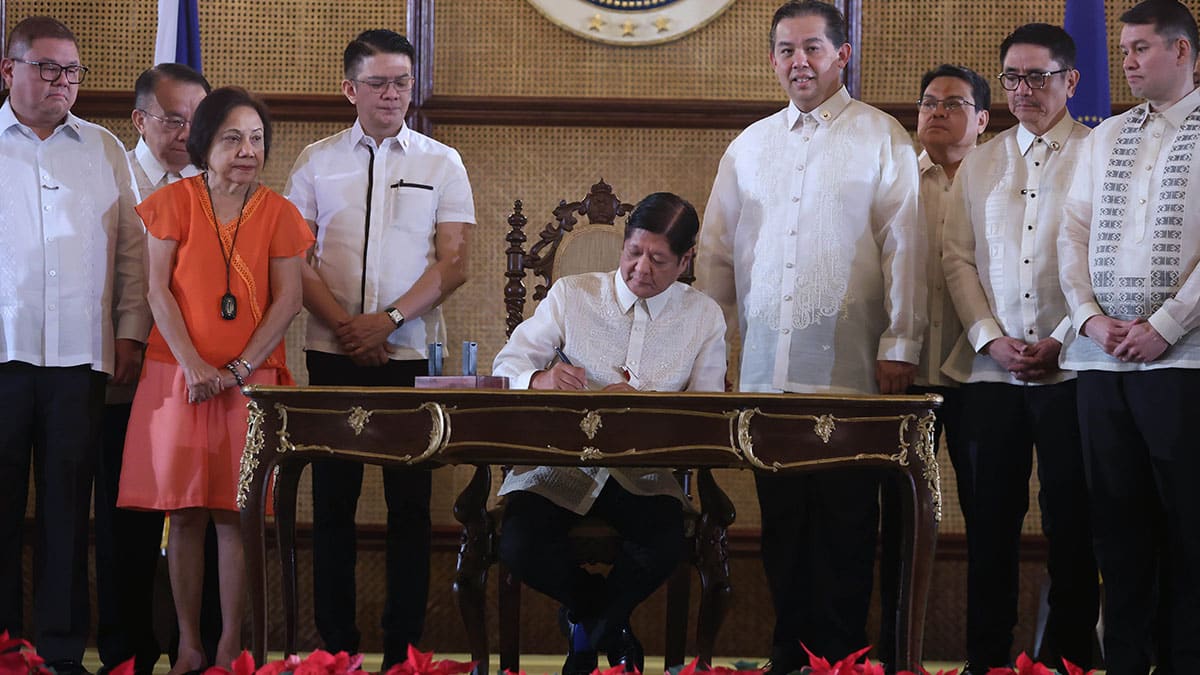Revised rice tariff law triples farmers’ support fund to P30B

BUSY DAY President Marcos signs three legislative measures into law on Monday, including the amendments to the Agricultural Tariffication Act, or Republic Act No. 12078, at Malacañang. —Marianne Bermudez
MANILA, Philippines — President Marcos signed on Monday Republic Act No. 12078 that seeks to prolong the lifespan of the Rice Competitiveness Enhancement Fund (RCEF) for another six years, or until 2031, and increase its allotment to P30 billion annually.
The law amends RA 11203, or the Agricultural Tariffication Law (ATL) of 2019, which liberalized rice trade in the Philippines by removing volume restrictions on rice imports that were subjected instead to lower tariffs.
Marcos said an amendment to the ATL was needed to strengthen the program and address the impending lapse of the six-year lifespan of the RCEF, which was originally given P10 billion a year from the tariff collected on rice imports to help local farmers.
“This will enable us to do much more for our farmers, ensuring that they have the resources that they need to succeed and to make the rice industry even more competitive,” he said.
While intended to stabilize rice prices, improve farmer competitiveness, and ensure food security, the ATL was met with criticism from local farmers as the influx of cheap imported rice led to lower farmgate prices for their production.
Article continues after this advertisementAgriculture Secretary Francisco Tiu Laurel Jr., who was interviewed after the signing, said the amended Rice Tariffication Law would lower retail rice prices in the country.
Article continues after this advertisementSalient provisions
RA 12078 also emphasizes reducing postharvest losses, according to the President.
“By preventing up to 375,000 tons of milled rice from being wasted annually, we can help feed an additional 3.4 million Filipinos each year for the next six years—improving food security and making rice more accessible to everyone,” he noted.
The new law empowers the DA to maintain stricter oversight on the rice industry, the President said, to ensure that “the rice reaching our markets [has] complied with quality standards and regulations.”
RA 12078 also mandates the Bureau of Plant Industry to inspect rice warehouses and manage a national database to track grain storage, safeguard food supply, and ensure its safety for the public.
Vetoed provisions
The President, however, vetoed two provisions of the enrolled bill before signing RA 12078.
In his Dec. 6 letter to Speaker Martin Romualdez, the President objected to a provision allowing the Department of Agriculture (DA) to retain P5 billion from its unused annual funding and use it as its “buffer fund.”
“I am constrained to veto a provision in Section 2 of the measure and a portion in Section 5 of the same bill … as these may be inconsistent with the principles of sound public fiscal management,” he said.
According to the President, the provision in the bill that sets aside P5 billion from the unused portion of the DA budget and treats it as a rice buffer fund “runs against the directive of Section 44 of Executive Order 292,” which mandates that “all accruing income of agencies shall be deposited in the National Treasury and shall be part of the unappropriated surplus of the general fund of the government.”
The President also vetoed a provision mandating the Bureau of Customs to remit its RCEF collection directly to the DA.
According to the President, the line veto of the two provisions is aimed at adhering to the “one fund” policy of the government, which discourages the creation of special funds.